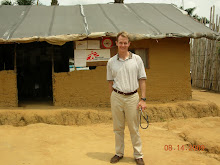
Since my Congolese counterpart is on vacation for the rest of October, I'm travelling to Mungele each day. It is 1 ¼ hours each way, giving me plenty of time to finish about a novel per week. This week I have been devouring Isabelle Allende's The House of the Spirits. The book is quasi-magical realism. The dead cross timelines, appearing in the present and then disappearing forever.
When I travel to places that have changed dramatically, I wonder what their past was like. Who lived here? What did it look like? I try to imagine the ghosts of the past coming back to life.

Lubutu has several Belgian colonial buildings. I see them each day as I walk or am driven through town. The most elegant ones are the present mayor's office and the OCPT, directly across the street from one another at the main crossroads of town. I've imagined that OCPT stood for Office Congolaise de Poste et Télécommunications or, maybe, it was Office Centrale de Poste et Télégraphe. The ruined building has steps leading up to a central porch. At the top of the stairs are three tellers windows where the mail or telegrams were dropped off. To the left are a hundred or so rotten wooden post office boxes, most missing their doors. There is no cornerstone or date anywhere on the building. To me it appears to have been built in the 1920s or 1930s, as the steps are rounded in the Art Deco style.
 There are dozens of old homes in the city, all falling apart. Standing in their front yards and obscuring the view are ugly wooden shacks, one abutting the next. These are pharmacies or shops. But step behind them and one gets a glimpse of what Lubutu must have been like under the Belgians. Big brick single story houses, with pitched metal roofs, each with a huge front porch. Inside there are big rooms with high ceilings. The large yards, now filled with weeds, must have once held vegetable and flower gardens.
There are dozens of old homes in the city, all falling apart. Standing in their front yards and obscuring the view are ugly wooden shacks, one abutting the next. These are pharmacies or shops. But step behind them and one gets a glimpse of what Lubutu must have been like under the Belgians. Big brick single story houses, with pitched metal roofs, each with a huge front porch. Inside there are big rooms with high ceilings. The large yards, now filled with weeds, must have once held vegetable and flower gardens. At the northern end of town stands the cathedral, red brick and bearing a date of 1929. Clustered around it are the convent (now Couvent, where I live), the church school, and the houses which most likely once held caretakers and gardeners. Except for the church and convent, all is slowly tumbling down.
The present Democratic Republic of Congo was first colonized by Europeans in 1885. Actually it was only one European, Leopold II, King of the Belgians. In February of that year, the European powers carved up Central Africa and established colonies. France got what is now Congo-Brazzaville and the Central African Republic. Portugal got Angola. And Leopold II got the Congo Free State. The king personally owned the colony, not the country of Belgium. He used his personal bank account to finance the construction of infrastructure, building roads and putting in a communication system. All money derived from mining and the rubber plantations went directly into the king's pocket. Initially the Congo Free State was immensely profitable. Unfortunately, the King's greed grew, resulting in brutal mistreatment of the population in order to increase revenues. Newspaper articles in Europe detailed the abuses. Two books published in the early 1900s created further scandal- Joseph Conrad's Heart of Darkness and Mark Twain's King Leopold's Soliloquy. In addition, the price of rubber collapsed rendering the Congo Free State financially unviable. At first Leopold II offered to reform the colony, but this was rejected by the European powers and public opinion. For two years, no country was willing to take over the Free State. But in November 1908 the government of Belgium annexed the territory, renaming it the Belgian Congo.
Conditions improved under the Belgian government. An educational system was started, run by the church. Proper physical treatment of all workers was legally guaranteed. Still, a system of de facto segregation separated the races; the center of town was inhabited by whites while the native Congolese lived on the outskirts.
As with most colonies, Belgium eventually grew weary of government from a distance. In the late 1950s there were riots in Léopoldville (now Kinshasa) as the Congolese demanded self-rule. In June 1960, they got their chance and independence followed.
I love to walk through the center of town, mentally erasing the shacks that now obscure the past. I imagine what Lubutu might have been like under Belgian rule. Was this a place where the colonists desired to live? Or was it punishment to be posted here, banished to the uncivilized end of the world?
Stay tuned. Thomas, one of the expatriates, knows a local elderly gentleman with a good memory. We have been promised an architectural and historical walk through Lubutu some time in the next few weeks. I hope to soon discover more about this corner of the Belgian Congo.




















